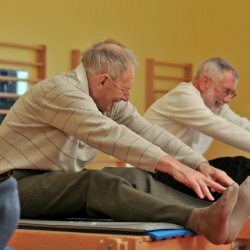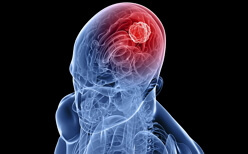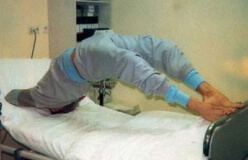How to Live with Parkinson's Disease
 Parkinson's disease is associated in many with the frail elderly, who are barely dragging their feet, which all fall out of hand. But Parkinson is not a verdict. It is important to acknowledge the "inconvenient" illness, not to give up, not to ignore the treatment, and to warn acquaintances about it to avoid gossip.
Parkinson's disease is associated in many with the frail elderly, who are barely dragging their feet, which all fall out of hand. But Parkinson is not a verdict. It is important to acknowledge the "inconvenient" illness, not to give up, not to ignore the treatment, and to warn acquaintances about it to avoid gossip.
What to attack
More often Parkinson is a disease of men who live in big cities. The brain ceases to produce a neurohormone called dopamine. This makes it difficult for the brain to send signals to other parts of the body. Internal communication is disrupted. But there are now medicines that, to some extent, can stimulate weakened brain functions.
Parkinson's disease bears the name of its discoverer, the English physician James Parkinson, who in 1817 wrote a paper on a trembling paralysis. Even then he noticed, and it remains relevant now that there are three main symptoms of this disease: the trembling of individual parts of the body( hands, feet, head), sluggish movements and agonizing stiffening of muscles. To this in due course other symptoms are added: problems with walking, swallowing, tongue. It is difficult for a person to get up from a chair, turn over from side to side in bed. Finally, Parkinson's disease, like, perhaps, all other diseases, can appear in various forms: mild, severe and even very severe.
Do not miss the first signs of
The disease creeps slowly, imperceptibly. Before the onset of obvious symptoms, it takes a long time. But the onset of Parkinson's development can be identified earlier, at a household level: it is important to pay attention to small things. For example, the man had a wide, wide handwriting. But from time to time he began to write small letters. And in general, the process of writing is not so easy as it used to be. From time to time, something falls from the hands to the floor. If you need to get out of the house, dressing lasts implausibly for a long time. In a nervous environment, some parts of the body begin to twitch: for example, the left or right side of the body, from the top down, the shoulder, hand, to the foot. Other, previously unremarkable weaknesses, pressure jumps, etc. are observed. Separately, many of the symptoms are typical of the elderly, but the examination does not hurt. The earlier to identify the "aggressor", the more effective the treatment will be.
Do not neglect
treatment Parkinson's disease is treated differently. Medicines for this disease are divided into several groups and various means do not exclude each other. In some publications, you can read that there are medications that have a side effect: cause depression, dizziness, even suicidal mania. A promising area is the treatment with stem cells.
But the underlying treatment is psychological support, understanding of others. It is important that the patient himself is used to Parkinson, family, colleagues are used. And this, perhaps, is the most important basis of life with Parkinson's disease: you do not need to pretend that you do not have it. This and so can not hide. We should politely inform everyone what is happening to you. There will be no stupid looks, gossip. And after a while, the disease becomes something habitual for everyone.
Risks of
What is really dangerous for people with this disease is their defenselessness even before a menacing illness. A common cold, which a healthy person does not even notice, for those suffering from Parkinson's disease becomes a real disaster: they sneeze and cough horribly, especially at night. And worst of all, it lasts for weeks. The person should beware, because he knows what it is threatening.
Another sensitive manifestation of Parkinson's disease is insomnia. There are two possible ways: resigned to fate, lie quietly with your eyes closed and wait, maybe a dream will come. To stuff the body with sleeping pills. Or stand up, shake up, take on all possible homework( if you do not interfere with others), read or even listen to music( via headphones, of course).
Understanding and Support of
The family must accept the fact that a person with Parkinson's disease moves much more slowly than everyone else. But you can not help such a patient in everyday business, for example, give him a coat, button up buttons, lace up shoes. He must do it himself, albeit slowly. If he gets used to help, he will either constantly wait for her, or will be angry that they treat him like a complete bezdari.
Sometimes patients with Parkinson's disease have problems with the process of eating: their hands are trembling. But again: you can not feed them, or even help them, while the sick themselves manage. The patient should not give up! A person must sometimes be forced to independence, even if he does not want it. It is not known whether there will always be someone who is ready to help. And then the helplessness of this person can be equal to death.
Some advice to patients
- It is necessary to agree with fate and not to protest. No one has found a cure for a bad fate. There is no way out: we must learn to live with this and even treat the disease with humor.
- You need to have more time for everything: from a daily toilet to crossing the street. I must remember: I myself move slowly, I have no chance of hurrying.
- If there are "nuances" with walking, avoid shoes on the leather soles, because they are slippery.
- To write memoirs( letters, notes to relatives, complaints), you need to buy a typewriter. Or, even better, learn to work on the computer.
- Patients with Parkinson often cause irritation in others who are "not in the subject".This leads to scandals. We must remember this and treat ourselves politely.
- Following Parkinson's disease, digestive problems occur. The less meat, the better. Recommended: bread from wholemeal flour, fruits, vegetables, especially chicken. Such patients usually drink a lot. They should always have clean water.



